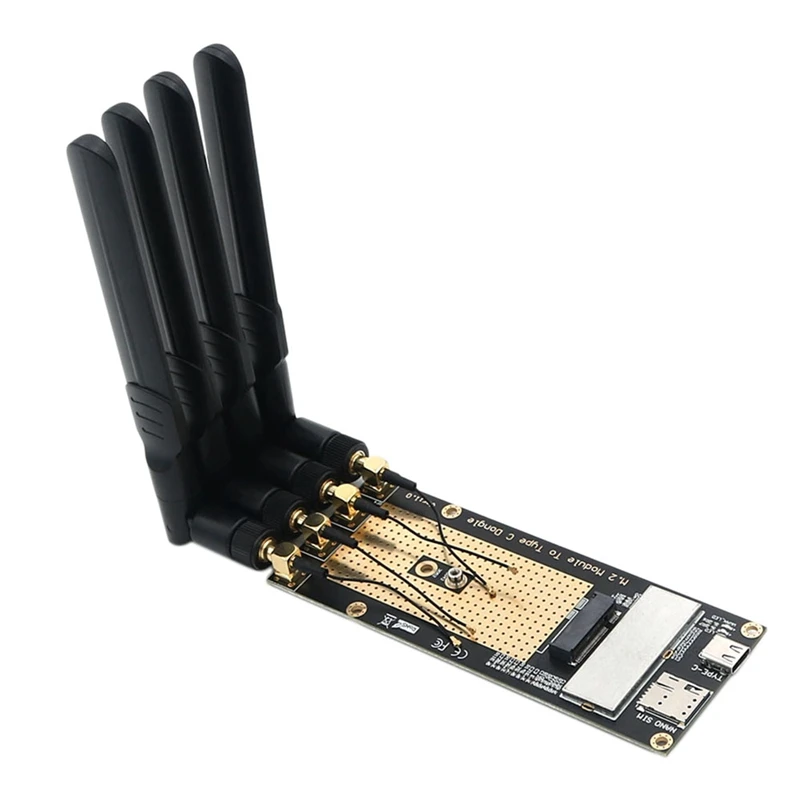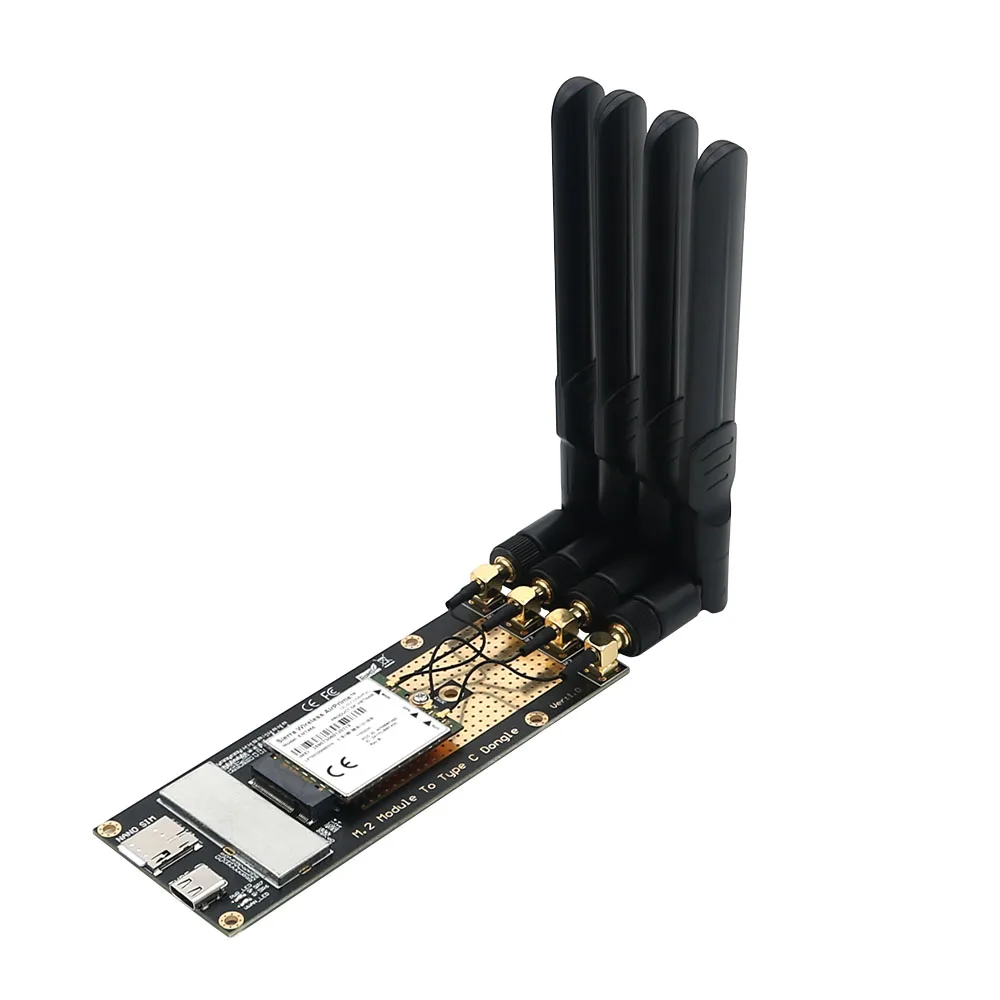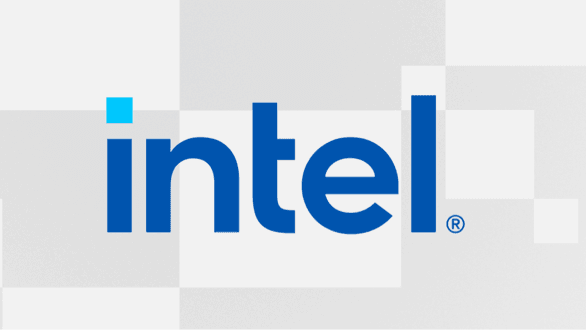You are using an out of date browser. It may not display this or other websites correctly.
You should upgrade or use an alternative browser.
You should upgrade or use an alternative browser.
Looking for usb interface wireless network card recommendation
- Thread starter qiuyan81
- Start date
zwitterion
Occasional Visitor
I'm pretty sure they don't make them at 2400mb speeds, which is probably due to limitations on the I/O port. Your best bet is this Asus:I want to buy a usb wireless network card that supports wifi6, the usb/typec interface supports 2400mb/160mhz wireless network card? I only see wireless cards with 1200mb/80mhz, which is not what I want. Please recommend one, thank you!
https://www.amazon.com/dp/B09QQWQS1N/?tag=snbforums-20
Tech Junky
Part of the Furniture
Buy an ax210 module and then find a M2 USB sled to put it into and you're all set.
Thank you for your reply, but the wireless network card you recommended is not what I want, it is based on 80mhz bandwidth, I want usb 160mhz.I'm pretty sure they don't make them at 2400mb speeds, which is probably due to limitations on the I/O port. Your best bet is this Asus:
https://www.amazon.com/dp/B09QQWQS1N/?tag=snbforums-20
Can this be done? m.2 interface to usb? Should I buy another m.2 ax210? Thank you, I will look for such a network card and adapter。Buy an ax210 module and then find a M2 USB sled to put it into and you're all set.
zwitterion
Occasional Visitor
You can get M.2 sleds to interface with USB and USB-C, however those are storage M.2's with connectors B & M, M, and B (with various types of storage e.g. SATA SSD, SATA M.2, PCIe NVMe SSD, and PCIe AHCI SSD. Wifi cards, like the AX210 are A & E connectors. I've never seen an A & E sled adapt to USB or USB-C. But if you find one, please link it because I have a spare AX210 card lying around here that I could put to good* use on that adapter. I would've bought one by now, I've just never found one.Can this be done? m.2 interface to usb? Should I buy another m.2 ax210? Thank you, I will look for such a network card and adapter。
Last edited:
Tech Junky
Part of the Furniture
Having looked into this for converting mPCI or M2 the other direction. It might take two pieces to make it work. There's no direct e-key and a-key doesn't matter. AliExpress has some cellular options with 2 or 4 antennas on the sleds.
zwitterion
Occasional Visitor
Yes one could finagle their way to get the pieces to fit, but I'm still not sure that would work. I think the issue is the complex WiFi protocols won't fit through the four bus connections on USB protocol, which significantly lowers HZ throughput even though hypothetically if you have a 3.2 Gen 2 USB connector you can put 5Ghz through it and thus achieving WiFi protocol of 160Mhz* The problem is complexity of protocol requires more bus connections, and having to add more adapters will reduce the HZ efficiency, I think
Tech Junky
Part of the Furniture
I think you're overthinking things since the M2 handles the RF and the USB handles the data. As long as the adapter<S> have the bandwidth to support the 5gbps USB connection it should be fine.
For instance the stuff I was looking at was for a 5G / LTE modem setup and there's no reason it can't handle 2.5gbps or more across the USB sled. I was also looking at 10gbps - C port sleds and avoiding anything with an A connector.

 www.aliexpress.com
www.aliexpress.com

 www.aliexpress.com
https://www.aliexpress.com/item/-/2251832854000969.html - PCI slot
www.aliexpress.com
https://www.aliexpress.com/item/-/2251832854000969.html - PCI slot
It's not going to be pretty or portable without some MacGyver skills to make a casing for it but, it will work just fine. The PCI version though is sort of a combo that would work for both a mPCI / M2 on the same board simultaneously.
For instance the stuff I was looking at was for a 5G / LTE modem setup and there's no reason it can't handle 2.5gbps or more across the USB sled. I was also looking at 10gbps - C port sleds and avoiding anything with an A connector.

25.56US $ 35% OFF|M.2(m.2) 3g/4g/5g Module To Type-c/usb3.0 Adapter+nano Sim Card Slot+4x Antenna For Rm500q/rm500u/gm800/sim8200 Module - Pc Hardware Cables & Adapters - AliExpress
Smarter Shopping, Better Living! Aliexpress.com

24.99US $ |M.2(M.2) 3G/4G/5G Module to Type C /USB 3.0 Adapter With NANO SIM Card Slot for RM500Q/RM500U /GM800/ SIM8200 Module| | - AliExpress
Smarter Shopping, Better Living! Aliexpress.com
It's not going to be pretty or portable without some MacGyver skills to make a casing for it but, it will work just fine. The PCI version though is sort of a combo that would work for both a mPCI / M2 on the same board simultaneously.
Tech9
Part of the Furniture
I think the issue is the complex WiFi protocols won't fit through the four bus connections on USB protocol
It's all data transferred with 0s and 1s. Not protocols straight like spaghetti and curly like noodles and some fit, some don't.
zwitterion
Occasional Visitor
And I think you're oversimplifying things, technology isn't magic, and sometimes it is beneficial to get into the weeds to try and understand why this would or wouldn't work. Obviously there must be a reason as to why there isn't readily available a WiFi A & E sled to USB adapter?I think you're overthinking things since the M2 handles the RF and the USB handles the data
Data originates through HZ, which is a measurement of electromagnetic frequency. How many bus paths determine how much bandwidth (HZ), which determines bit rate (0 and 1), which will affect the WiFi throughput. This is Shannon's Theorem, which shows how bit rate is limited by bandwidth and the signal-to-noise ratio of the channel: C=B log2(1+SNR). So, if we count the differences between WiFi bus paths VS. USB bus path, then we could extrapolate the protocol limitations which then in turn affect protocols. Or we could just say maybe this product doesn't exist* because it's impossible to engineer.It's all data transferred with 0s and 1s.
SwampKracker
Senior Member
Every "hi-performance" USB dongle I have tried in the past has always been a disappointment. The cheap ones on the other hand, seem to work fine. Just my experience...
Tech Junky
Part of the Furniture
Because if they make a pretty all in one option they can charge 3x more.Obviously there must be a reason as to why there isn't readily available a WiFi A & E sled to USB adapter?
zwitterion
Occasional Visitor
As a reminder, OP is looking for a USB product that provides the full performance output, with no compromises, in relation to PCIe I/O. Other products, say NVMe to USB, always compromise their performance in regards to this relation. As a consequence, performance and robust protocol features are sacrificed through USB I/O.
zwitterion
Occasional Visitor
Hardware determines software. The issue we're talking about here is an electrical engineering problem, which involves understanding the relation between bit rate, HZ, and bandwidth, which is what WiFi uses. Just because USB can get 10Gbps doesn't mean it will work. Unless you can explain to me how those three variables relate to each other. However, since you just declared that I'm confused about trying to understand this relation I'd make a bet you're not concerned with applying theory to practice.
Tech Junky
Part of the Furniture
5gbps port can handle a 1200mbps 160mhz WiFi signal just fine. The issue is related more so to the OEMs not making adapters due to certification delays. The usual suspects in making the chips for WiFi delayed things waiting on 6e spectrum to be released to not have to make 6 & 6e variants. Intel on the other hand has both options providing 160mhz WiFi adapters in m2 format. USB options tend to use realtek mediatek Qualcomm and others because they're cheaper than Intel. It's nothing to do with the electrical engineering as you seem to be stuck on.
zwitterion
Occasional Visitor
5gbps port can handle a 1200mbps 160mhz WiFi signal just fine. The issue is related more so to the OEMs not making adapters due to certification delays. The usual suspects in making the chips for WiFi delayed things waiting on 6e spectrum to be released to not have to make 6 & 6e variants. Intel on the other hand has both options providing 160mhz WiFi adapters in m2 format. USB options tend to use realtek mediatek Qualcomm and others because they're cheaper than Intel. It's nothing to do with the electrical engineering as you seem to be stuck on.
This is rich. So you start by saying easy, just buy these thingy's and it'll work, but then I say wait maybe there's a reason it won't, so I try to understand the electrical engineering approach as to explain maybe why it doesn't exist, but then you finally decide to put in a little effort just to prove that it isn't an engineering problem it's certification delays. We are in fact dealing with electrical engineering (so it can be justified to be "stuck" on trying to understand the thing in which this all works on), and if you would've just provided this as your original answer rather than finagling crap together for poor OP to buy and potentially waste money, and then shunning my approach, this would've turned out much differently.
Tech Junky
Part of the Furniture
@zwitterion
It's not an engineering issue. It's a spectrum issue with Governments needing to sign off on the spectrum changes for 6E. As soon as everyone's in agreement then the products rollout quicker. Intel already attempted to saturate the market with the AX200/210 options for internal use.
If you want bleeding edge 160mhz bandwidth over USB you need to take it into your own hands at the moment. (initial reply / suggestions)
If you want something more refined then you need to wait but, being 2 plus years into 6/6E with Intel it's apparent what the issue is and it's not an engineering issue it's a product development delay due to the spectrum not being released worldwide yet. It's making progress though in different countries releasing it and certifying it for use on the consumer side.
Maybe I need to make this stupidly simple for you?
USB 5gbps <> USB sled <> M2 AX200/210 <> Antennas = WIFI @ 160mhz
The only electrical engineering issue would be if the card exceeded the 5V output from the USB port and if that's the case then you would need to look into a port that provides higher output with PD certification. The card itself though isn't power hungry.

 www.intel.com
www.intel.com

@qiuyan81
https://www.amazon.com/dp/B09MD7G292/?tag=snbforums-20
https://www.amazon.com/dp/B09M3PKGXS/?tag=snbforums-20
https://www.amazon.com/dp/B07T48C7KB/?tag=snbforums-20
https://www.amazon.com/dp/B09B1CWLBK/?tag=snbforums-20
https://www.amazon.com/dp/B09QQWQS1N/?tag=snbforums-20
These should be able to get close to a 6/6E in terms of speed. While they're not topping out on the 5ghz band @ 2400mbps like the Intel internal card they get you 1/2 way there. Dig through the reviews to check actual speed throughput though.
It's not an engineering issue. It's a spectrum issue with Governments needing to sign off on the spectrum changes for 6E. As soon as everyone's in agreement then the products rollout quicker. Intel already attempted to saturate the market with the AX200/210 options for internal use.
If you want bleeding edge 160mhz bandwidth over USB you need to take it into your own hands at the moment. (initial reply / suggestions)
If you want something more refined then you need to wait but, being 2 plus years into 6/6E with Intel it's apparent what the issue is and it's not an engineering issue it's a product development delay due to the spectrum not being released worldwide yet. It's making progress though in different countries releasing it and certifying it for use on the consumer side.
Maybe I need to make this stupidly simple for you?
USB 5gbps <> USB sled <> M2 AX200/210 <> Antennas = WIFI @ 160mhz
The only electrical engineering issue would be if the card exceeded the 5V output from the USB port and if that's the case then you would need to look into a port that provides higher output with PD certification. The card itself though isn't power hungry.

Product Brief: Intel® Wi-Fi 6E AX210 (Gig+) Module
Product Brief: Learn about the Intel® Wi-Fi 6E AX2 10 (Gig+) adapter. Featuring greater network flexibility, greater speed, and reduced latency.
@qiuyan81
https://www.amazon.com/dp/B09MD7G292/?tag=snbforums-20
https://www.amazon.com/dp/B09M3PKGXS/?tag=snbforums-20
https://www.amazon.com/dp/B07T48C7KB/?tag=snbforums-20
https://www.amazon.com/dp/B09B1CWLBK/?tag=snbforums-20
https://www.amazon.com/dp/B09QQWQS1N/?tag=snbforums-20
These should be able to get close to a 6/6E in terms of speed. While they're not topping out on the 5ghz band @ 2400mbps like the Intel internal card they get you 1/2 way there. Dig through the reviews to check actual speed throughput though.
Similar threads
- Replies
- 23
- Views
- 3K
- Replies
- 1
- Views
- 5K
- Replies
- 19
- Views
- 2K
Similar threads
Similar threads
-
-
Looking to buy a new router to complement my AC86U (for mesh system)
- Started by bkselly
- Replies: 18
-
Looking for a mesh system with existing Asus GT-AX11000 Pro
- Started by Lamminium
- Replies: 3
-
-
Looking for a Secure and Long-Term Supported Router (Home Use)
- Started by NoShine
- Replies: 19
-
I'm looking for a Wi-Fi 6E router for my MacBook M4 Pro
- Started by Macintosh
- Replies: 13
-
Is SmallNetBuilder website up to date? (Looking for product recommendations)
- Started by Mp1
- Replies: 16
-
Looking for mesh router(s) that have schedule based guest network
- Started by raidthebarn
- Replies: 2
-
Looking for a new AI mesh node to pair with my new GT-BE98 Pro base
- Started by stilessm
- Replies: 10
-
Latest threads
-
For Asus BE router users that randomly drop wifi 2.4 ghz clients
- Started by conflictednetworks
- Replies: 2
-
-
-
amtm I want to leverage the email function within amtm
- Started by Ripshod
- Replies: 3
-
how to get s/n without labels XT8
- Started by olagh
- Replies: 4
Support SNBForums w/ Amazon
If you'd like to support SNBForums, just use this link and buy anything on Amazon. Thanks!
Sign Up For SNBForums Daily Digest
Get an update of what's new every day delivered to your mailbox. Sign up here!
Staff online
-
RMerlinAsuswrt-Merlin dev
